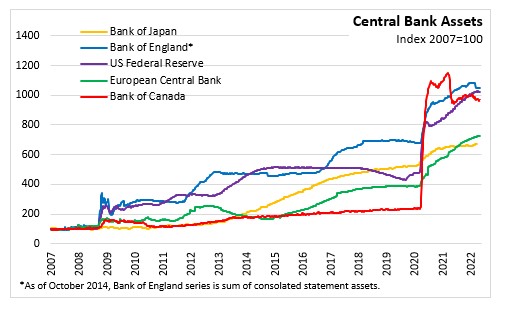The Economics and Statistics Division maintains archives of previous publications for accountability purposes, but makes no updates to keep these documents current with the latest data revisions from Statistics Canada. As a result, information in older documents may not be accurate. Please exercise caution when referring to older documents. For the latest information and historical data, please contact the individual listed to the right.
<--- Return to Archive
For additional information relating to this article, please contact:
May 05, 2022BANK OF ENGLAND MONETARY POLICY The Bank of England Monetary Policy Committee (MPC) voted by 6-3 to increase the Bank Rate by 0.25 percentage points to 1.0%. The minority in the vote preferred to increase the Bank Rate to 1.25%. Based on its current assessment of the economic situation, the MPC noted that some further modest tightening in monetary policy may still be appropriate in the coming months. However, how medium term inflation projections shape might create both upward and downward risks for upcoming monetary policy decisions.
Russia's invasion of Ukraine intensified global inflationary pressures and had led to a deterioration in the UK and global economic outlooks.
UK GDP is estimated to have increased 0.9% in Q1 2022, stronger than expected in the Bank's February Monetary Policy Report. Further relaxation of health measures in the first two months of the year supported the growth. While supply chain pressures weighted less on activity in the early part of the year, recent indicators point to worsening in supply chain disruption reflecting recent Omicron-related lockdowns in China and Russia’s invasion of Ukraine. Real GDP is expected to grow 3.75% in 2022. The Bank expects UK economic activity to decline 0.25% in 2023 followed by a 0.25% growth in 2024.
The labour market has tightened further since the February Report. Job vacancies reached a new record high in the three months to February, and the unemployment rate fell to 3.8% at the same time.
Real incomes have started to fall due as the effects of Russia’s invasion of Ukraine intensified. While recently announced government policies are expected to provide some support to household incomes in the near term, real household disposable income is expected to fall by 1.75% in 2022, half a percentage point more than projected in February report.
Consumer Price Inflation (CPI) increased to 7.0% in March with core CPI increasing to 5.7%. Both CPI and core CPI increases higher than expected in the February Report. The Bank noted that goods and energy price inflation together accounted for around 80% of the overshoot of CPI inflation in March relative to the MPC’s 2% target. CPI is expected to further increase to 9.1% in April as the 54.0% increase in the Ofgem energy price cap announced in February comes into effect. Global supply bottleneck and the impacts of Russia's invasion of Ukraine are expected to keep inflation elevated. Inflation is expected to increase 10.25% in 2022 before moderating to 3.5% in 2023 and to 1.5% in 2024.
The next scheduled monetary policy meeting will be held on June 16, 2022. An updated Monetary Policy Report will be provided at the August 4 meeting.





Source: Bank of England, Monetary Policy Summary, Monetary Policy Report - May 2022
<--- Return to Archive